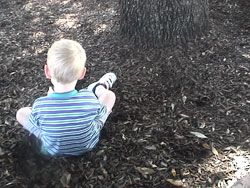Behavior Checklist for Early Childhood
Sometimes, young children may meet their milestones but display unusual (atypical) behaviors that can be troubling to families. Unfortunately, sometimes, these children are not meeting their milestones either.
Regardless of whether their milestones are met, it is essential to get these youngsters to their local ECI program as soon as a problem with behavior is suspected. Seeking early help is their best chance for a positive outcome.
The checklist below tells you some behaviors that could mean your child needs help. If your child displays 2 or 3 of these behaviors consistently, call your local ECI program today.
If the ECI program is not the most appropriate program for your child, they will help you find the program that is.

- hits, bites, and kicks others for no apparent reason
- tantrums excessively
- overly destructive or aggressive
- out of control
- refuses to ride in a car seat
- pulls own hair, bites self, or bangs own head
- spins self in circles and spins wheels on toys constantly
- cannot take their eyes off a ceiling fan
- does not play appropriately with toys
- flaps their hands
- flicks, toys, or other objects
- gags on food almost every day
- puts everything into their mouth after 15 months of age
- addicted to TV, videos, DVDs
- poor eye contact or lack of eye contact except when they want to look at you
- does not like to be touched or cuddled, even when sleepy or not feeling well
- cannot stand noisy places
- cannot go out into public without significant problems
- does not understand what you say after 16 months of age
- does not interact with others
- in their own little world
- got kicked out of childcare
- makes only repetitive sounds like "dee-dul-dee-dul-dee-dul-dee-dul," etc.
- overly concerned with lining things up
- cannot tolerate walking barefoot in the grass
- cannot tolerate getting hands, etc. dirty
- does not point or communicate wants/needs after 16 months of age
- loss of speech or other skills at any age
- does not sleep well
- is "too good of a baby" when less than a year old, requiring little or no attention from you to be happy
- cannot vary their routine without major behavior problems
- seems to feel no pain
- does not capture your attention with a toy, wanting you to look at it with them
- does not play turn-take games like saying sounds or words back and forth with you
- your child is doing anything else that seems unusual to you or other family members, and you are worried about it
Remember, it's never too early to ask for help. Click here to contact Klaras Children's Center ECI.

